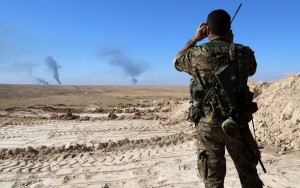
Paris, France—World leaders hailed “real progress” in Syria on Friday, but fresh air strikes showed the fragility of the week-old truce as the opposition cast doubt on its attendance at talks next week in Geneva.
Warplanes struck a key rebel bastion east of the Syrian capital for the first time since the United States-Russia-brokered truce — which excludes the fight against jihadists — began last weekend, a monitor said.
“Two air strikes hit the edge of the town of Douma in Eastern Ghouta and one person was killed,” said Rami Abdel Rahman, head of the Britain-based Syrian Observatory for Human Rights.
He said either Syrian or Russian planes carried out the strikes.
Eastern Ghouta had been regularly bombarded by government forces, but has been relatively calm since the ceasefire came into force, which has also allowed the United Nations to begin delivering aid to three rebel towns in the area.
British, French, German and European Union foreign ministers met in Paris to discuss the truce, saying there had been “real progress.”
“This cessation of hostilities is by no means perfect but it has reduced the level of violence, it has created an opportunity for some humanitarian access,” said British Foreign Secretary Philip Hammond.
Protesters in opposition-held areas — buoyed by the ceasefire — also took to the streets for the first time in years to demonstrate against the regime under the slogan “The Revolution Continues!”
Waving the three-starred tricolor flag that has become the uprising’s emblem, demonstrators in opposition-held areas of Aleppo, Damascus, Daraa and Homs called for Syrian President Bashar Al-Assad’s downfall.
Late Friday, a group of rebel fighters seized control of a crossing on the Iraqi border, the Syrian Observatory for Human Rights said.
Focus on Geneva
The quartet of foreign ministers said the focus now was on convincing all parties to return to UN-brokered peace talks in Switzerland tentatively set for next Wednesday.
“We want a speedy resumption of the negotiations in Geneva, but two conditions must be fulfilled: access for all Syrians to humanitarian aid, and full respect of the ceasefire,” said French Foreign Minister Jean-Marc Ayrault.
But Riad Hijab, head of Syria’s main opposition body, the High Negotiations Committee, said the opposition had not yet decided whether it would come to the talks.
Citing continued sieges and the fact that thousands still languish in regime jails, Hijab said Assad would have “no place” in a political transition because he has “blood on his hands.”
Speaking by phone on Friday, US Secretary of State John Kerry and his Russian counterpart Sergei Lavrov agreed on the need for a return to the negotiating table.
“The two sides called for a speedy start to negotiations in Geneva between the Syrian government and the opposition under the UN’s auspices,” a Russian foreign ministry statement said.
Turkish armed forces launched new artillery strikes on positions of the Islamic State (IS) group in Syria, the state-run Anatolia news agency reported.
Russia however accused Turkey of continuing to bombard Kurdish positions and allowing jihadist groups to receive weapons across its border, putting “the ceasefire in danger,” the Russian defense ministry said in a statement.
‘Totally unrealistic’
World leaders expressed a sharp difference of opinion over Assad’s plans to hold elections next month — way ahead of a roadmap agreed in November.
“The idea that there could be elections (in April) is not just provocative but totally unrealistic,” said French President Francois Hollande.
But Assad’s key backer, Russian President Vladimir Putin, shot back that the plan for elections “does not interfere with steps to build the peace process.”
The UN envoy on the crisis, Staffan de Mistura, said that whatever the timetable, it had to be Syrians who decided their president’s fate, not outsiders.
Doctors Without Borders (MSF) said tens of thousands of displaced Syrians along Turkey’s border have not returned home despite the truce.
“Some 100,000 people gathered near the border — including 50,000 in past weeks after the spike in violence in early February from the Syrian government coalition — have not yet started to return home because it’s too dangerous,” MSF head Joanne Liu told AFP.
“We’re in a transition period and I think it will take another few days for things to settle and for people to become convinced there really is a truce,” she said.
© 1994-2016 Agence France-Presse







